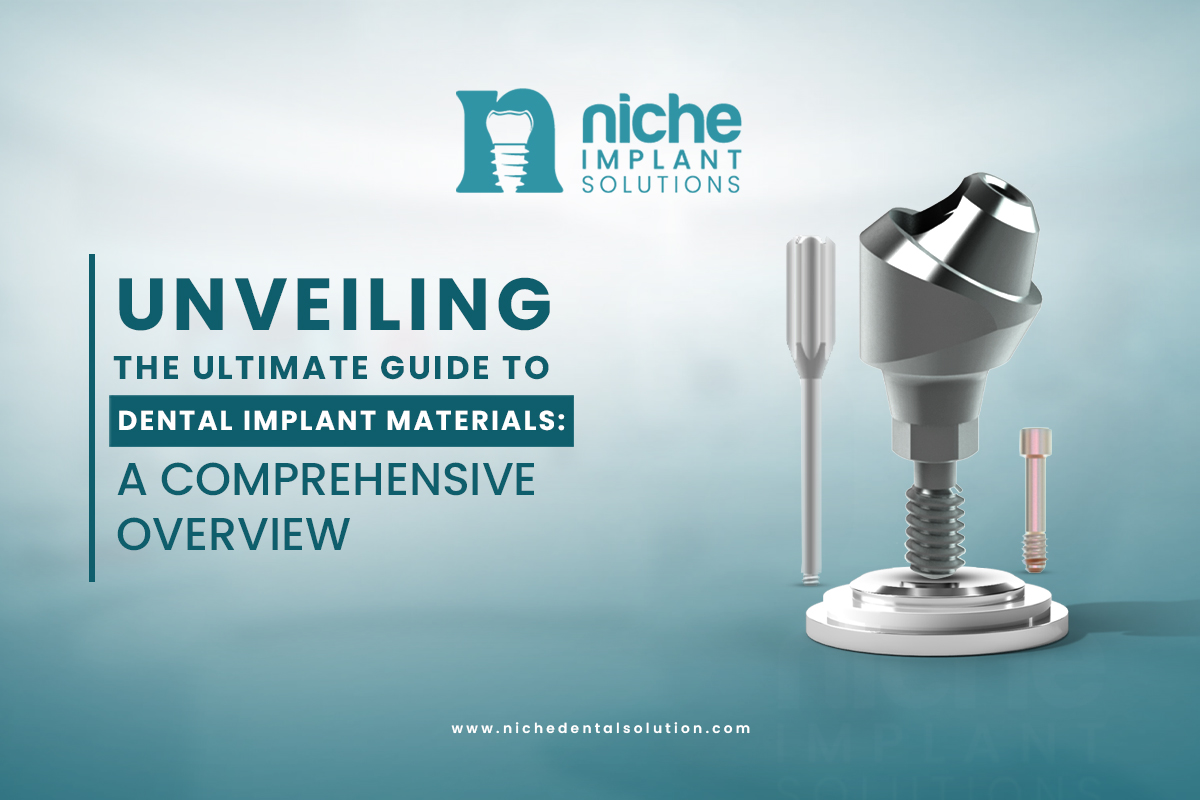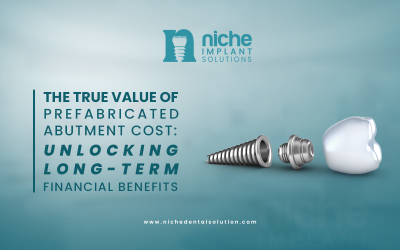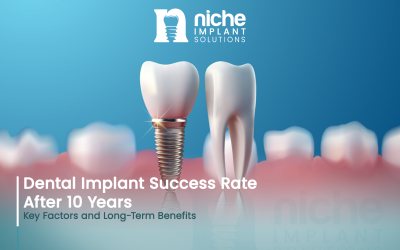In the realm of modern dentistry, dental implants have revolutionized the restoration of missing teeth. Central to the success and longevity of dental implants are the materials from which they are crafted. Understanding the nuances of dental implant materials is crucial for both patients and dental professionals alike. In this comprehensive guide, we delve into the world of dental implant materials, exploring their types, properties, advantages, and considerations.
1- Why Do Dental Implant Materials Matter?
Dental implant material plays a crucial role in the success and longevity of your implant. They directly impact:
- Biocompatibility: The material’s ability to integrate seamlessly with your jawbone, fostering a strong and lasting bond for optimal implant stability.
- Durability: The material’s strength to withstand the rigors of chewing and biting for years to come.
- Aesthetics: The material’s ability to create natural-looking restorations that blend seamlessly with your smile.
Considering these factors is crucial for a successful and satisfying implant experience.
The Main Players: Common Dental Implant Materials
Let’s explore the two most commonly used dental implant material and a less frequent, yet promising, alternative.
Titanium: The Champion of Strength and Biocompatibility
Comprising roughly 90% of the dental implant market, titanium reigns supreme. Here’s why:
- Unmatched Biocompatibility: Biocompatible means the body readily accepts the dental implant materials. Titanium boasts an exceptional track record, rarely causing rejection or allergic reactions.
- Outstanding Osseointegration: Osseointegration refers to the implant fusing with the jawbone. Titanium exhibits exceptional osseointegration, creating a rock-solid foundation for your replacement tooth.
- Superior Strength and Durability: Titanium is incredibly strong and lightweight, making it ideal for withstanding everyday wear and tear.
Types of Titanium Implants ( Dental implant materials ):
There are two main types of titanium implants:
- Commercially Pure Titanium: This type offers the highest level of biocompatibility, making it a good choice for patients with metal allergies or concerns.
- Titanium Alloys: Combining titanium with other metals like aluminum or vanadium enhances strength and durability, ideal for complex implant placements requiring additional support.
Zirconia: The Esthetic Contender
Zirconia, a ceramic material, is gaining traction due to its:
- Natural Appearance: Zirconia closely mimics the translucency and color of natural teeth, creating aesthetically pleasing results, especially for implant crowns in the front of the mouth.
- Biocompatible: Zirconia is generally well-tolerated by the body, minimizing the risk of rejection.
- Metal-Free: Patients with metal allergies or a preference for metal-free restorations find zirconia appealing.
Things to Consider with Zirconia Implants:

While zirconia offers aesthetic advantages, there are some trade-offs:
- Durability: Zirconia is not as strong as titanium. While still durable, it may not be the best choice for areas of the mouth subjected to high biting forces, like the back molars.
- Cost: Zirconia implants are often more expensive than titanium.
Other Dental implant materials
- While less common, other materials like biocompatible polymers are being explored for dental implants. However, long-term data on their efficacy is still limited.
2- Factors Influencing Your Choice of Dental Implant Materials
Besides the material properties, several factors influence your dentist’s recommendation and your final decision:
- Location of the Implant: Implants in the front of the mouth prioritize aesthetics, making zirconia a potential choice. Those in the back prioritize strength, favoring titanium.
- Jawbone Health: Healthy jawbone density is crucial for successful osseointegration. In cases of bone loss, titanium’s superior strength may be preferred.
- Medical Conditions: Certain medical conditions might necessitate specific materials. Discuss any concerns with your dentist.
- Budget: Titanium implants are generally more cost-effective than zirconia.
A Word on Cost:
Dental implant materials costs vary depending on factors like the dentist’s experience, geographical location, material selection, and complexity of the case. While zirconia implants may carry a higher price tag, consider it an investment in a natural-looking and potentially metal-free option.
Also Read: Keeping Your Practice Functioning Smoothly : The Essential Guide to Dental Supply Companies
Consulting Your Dentist: Choosing the Right dental implant materials for You
Choosing the right dental implant material requires a collaborative approach. Here’s what to expect during your consultation:
- Comprehensive Dental Exam: Your dentist will assess your oral health, jawbone density, and any existing conditions.
- Discussion of Your Goals: Discuss your aesthetic and functional expectations and any preferences for metal-free options.
- X-rays and Scans: These imaging studies provide detailed information about your jawbone structure to determine suitable implant placement.
- Material Recommendations: Based on your unique case, your dentist will recommend the optimal material for a successful and long-lasting implant.
3.The Importance of Dental Implant Materials:
Dental implant materials are the building blocks of successful implant restorations. These materials not only provide structural support but also interact with the surrounding oral environment. Factors such as biocompatibility, strength, and aesthetics play a significant role in material selection and ultimately determine the long-term success of dental implants.
4.Factors to Consider When Choosing Dental Implant Materials:
Several factors influence the selection of dental implant material, including patient health, anatomical considerations, aesthetic preferences, and functional requirements. Dentists carefully evaluate these factors to determine the most suitable material for each individual case, ensuring optimal outcomes.
5.Biocompatibility and Tissue Response:
Biocompatibility is a critical aspect of dental implant materials, ensuring compatibility with the body’s tissues and minimizing the risk of adverse reactions. Both titanium and zirconia implants exhibit excellent biocompatibility, promoting healthy tissue integration and long-term stability.
6.Mechanical Properties and Strength:
The mechanical properties of dental implant materials, such as strength, toughness, and fatigue resistance, are essential for withstanding the forces of mastication and maintaining long-term functionality. Titanium implants are renowned for their high strength-to-weight ratio, while zirconia implants offer excellent fracture resistance and stability.
7.Aesthetics and Natural Appearance:
Achieving natural-looking dental restorations is a priority for many patients. Dental implant material plays a crucial role in determining the aesthetic outcome of implant treatment. Zirconia implants, with their tooth-colored appearance and translucent properties, closely mimic natural teeth, enhancing smile aesthetics and patient satisfaction.
8.Long-Term Success and Survival Rates:
The long-term success of dental implants depends on various factors, including material selection, surgical technique, and post-operative care. Clinical studies have demonstrated high survival rates for both titanium and zirconia implants, with success rates exceeding 95% over ten years or more.
Understanding dental implant materials is essential for achieving optimal outcomes in implant dentistry. Whether opting for titanium, zirconia, or other materials, patients and dentists must consider a range of factors to ensure successful implant treatment. By choosing the right material and collaborating closely with their dental team, patients can enjoy the benefits of restored oral function, improved aesthetics, and enhanced quality of life.
The Insider’s Guide to Sourcing Top-Tier Dental Implant Materials: A Niche Advantage
In the world of dentistry, where precision and quality reign supreme, sourcing the right dental implant material is paramount. For niche suppliers like yourselves, catering to discerning dental professionals requires a deep understanding of implant materials and their impact on patient outcomes. This guide equips you with the knowledge to confidently navigate the world of dental implant material, empowering you to become a trusted partner for dentists seeking the best.
Building Trust with Dentists: Communication is Key
In a niche market, building trust with dentists is crucial. Here’s how to establish yourself as a reliable source for dental implant materials:

- Develop Exceptional Customer Service: Provide prompt and informative responses to inquiries, offer comprehensive product information, and be readily available for support.
- Offer Educational Resources: Develop educational materials, host webinars, or partner with dental associations to educate dentists on the nuances of dental implant material.
- Case Studies and Testimonials: Showcase successful implant outcomes achieved using your materials. Share case studies and gather positive testimonials from dentists using your products.
By demonstrating your expertise and commitment to quality, you can position yourself as the go-to source for dentists seeking the best dental implant materials.
- The [Niche] Difference: Exceptional Quality and Service
What sets Niche apart is our unwavering commitment to quality and service. We work closely with leading manufacturers to source the finest dental implant materials, ensuring unparalleled reliability and performance. Our team of experts is dedicated to providing personalized support and guidance, helping you navigate the complexities of implant material selection with confidence.
- Maximizing Success with Evidence-Based Solutions
At Niche, we believe in the power of evidence-based dentistry to drive success and innovation. That’s why we continuously invest in research and development, staying abreast of the latest advancements in dental implant material and technology. With our evidence-based solutions, you can rest assured that you’re offering your patients the best possible care and outcomes.
- Empowering Your Practice with Niche:
Whether you’re a seasoned implantologist or just starting your implant journey, Niche is here to support you every step of the way. With our extensive range of dental implant materials, backed by unparalleled quality and service, you can elevate your practice to new heights of excellence. Join the Niche family today and experience the difference for yourself.
Conclusion: Thriving in the Niche of Dental Implant Materials
The niche market of dental implant material presents a unique opportunity. By understanding the impact of materials on implant success, focusing on high-quality offerings, and building trust with dentists, you can carve out a successful space in this specialized market. Remember, your commitment to quality and expertise will be your key to success.





0 Comments